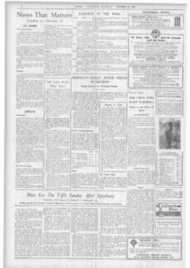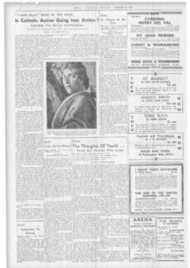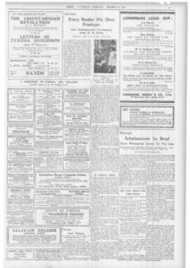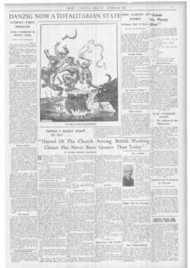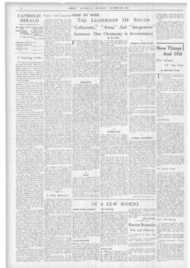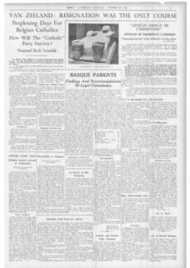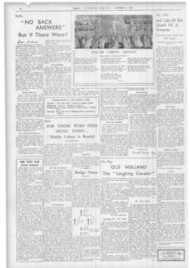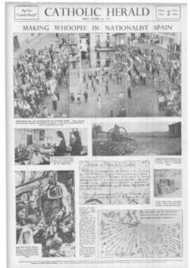Page 3, 29th October 1937
Page 3

Report an error
Noticed an error on this page?If you've noticed an error in this article please click here to report it.
Tags
Share
Related articles
Gen. O'duffy:
" In Franco's Spain "
Flat Denial Of Alleged Atrocities Witnessed By Irish
Pope Blesses Franco's Charitable Organisations
Lies Concerning Irish Brigade In Spain
Gen. O'Duffy Accuses Capt. McCullagh And efen s rich Brigade
General O'Duffy, leader of the Irish Brigade which fought for Franco over a period of eight months, has written a letter to the Catholic Herald in reply to certain allegations made by Captain McCullagh about the Brigade.
The General's letter is directed agaittsi extracts of Captain McCullagh's book " In Franco's Spain," which were published in the Catholic Herald (October 15 ).
From General O'Duffy.
SIR,—If the extracts published in the Catholic Herald are to be taken as an index of Capt. McCullagh's forthcoming book, he evidently has much mud to throw on " the Irish."
Capt. McCullagh wrote me pages of appeals to permit him to be present at our Brigade reviews by General Franco and other officers of the Higher Command, to visit the Brigade at the Front, and generally to facilitate him as a journalist. I am extremely sorry I was unable to accede to his persistent requests. and no one knows better than he that the regulations of the service did not permit me. Had he produced authority to visit the Irish lines from General Franco's Press Department would have been only too happy to facilitate him. But for some reason or other he was all the time under the impression that I could bring him along, and because I adhered to the regulations 1 must now bear with his ire. But the faith which sustained me against what appeared to be almost insuperable obstacles in the organisation of an Irish Brigade to fight in the cause of Christianity in Spain, will. please God, also sustain me to bear his petty pin pricks now.
Were These True?
Capt. McCullagh's present reliability as a writer can be judged by the following extracts from his articles : " General O'Duffy is a benevolent old gentleman of 65 years." " President de Valera sent Father Kearney, an Trish clergyman of Madrid, to Salamanca, to bring home all the Irish who wanted to go. Father Kearney wrote to General O'Duffy soliciting an interview but O'Duffy did not reply." The Saorstat Minister to Spain, Mr. L. H. Kerney, made representations regarding minors, and 1 replied through General Franco, and then Capt. McCullagh writes to the New York Times of May 6, 1937, telling the Irish in America, while the Brigade was yet in Spain, that " the mothers of the members of the Brigade were in Irish work-houses, that their fathers were on relief, and their children in reformatories." I need make no comment on this.
Capt. McCullagh bases some of his attacks on the Brigade on what he was told by Rory O'Sullivan. The fact is there was no person in the Brigade of that name.
Publicity and " Busty"
Capt. McCullagh says O'Duffy was anxious for publicity. He says a Capt. Bustamente and his staff were working overtime eliminating from cables, articles and letters all reference to the Irish Brigade and its commander. There was no such person attached to the Irish Brigade, but if journalists were drawing on their imagination and writing trash it was necessary to cut it out, for from the day the Brigade arrived in Spain up to and including the day it left I did not give an interview to any journalist.
Capt. MeCullagh's association with the Irish Brigade consisted of one visit to the Front at Ciempozuelos. This was in my absence, and the Spanish Press authorities required an explanation as to why the visit was allowed. When he writes about the Brigade he is either drawing on his own imagination or relying on hearsay. With the exception of the irregular visit referred to above he was all the time at least 100 miles from the Irish lines. Talevera is half-way between the Irish. Brigade Depot at Caceres and the Madrid front line. I made a hurried call there about four times weekly.
The "Comfortable Hotel "
I presume it is to this Capt. McCullagh refers when he wrote in another article drawing the contrast that while the men were enduring the hardships of the trenches I was in a " comfortable hotel," Capt. McCullagh himself was staying at this "comfortable hotel." He was there on every occasion I passed—always on the look out for news which I was not permitted to give him, and to avoid unpleasantness I tried to avoid him.
Our little unit held the section assigned to it on the Jarama Front in sight of Madrid for a period of 1I weeks without relief, and though depleted in numbers we preserved our individuality and refused to be merged in other units. We did as much as any other Bandera on the fronts we occupied, and handed over our positions intact at the end. I suppose the Captain expected " the Irish " to leave their position and rush across to the enemy lines, making sure that he was there to write up the story of the wild indisciplined•Irish for foreign consumption.
A Last Word
Capt. McCullagh may continue writing about my incompetence—I can afford to make him a present of all he can say in this respect. To put it briefly he asked me for facilities which I was not allowed to give him, and it is unfortunate that because of this he should allow his rancour to run away with him for the edification of our enemies. I presume he is a Catholic and an Irishman, and if the best service he can render to the cause is to attempt to ridicule those who tried to do their best under most difficult and trying circumstances 1 would suggest that his talents as a writer could be better employed.
EUIN O'DUFFY.
blog comments powered by Disqus



